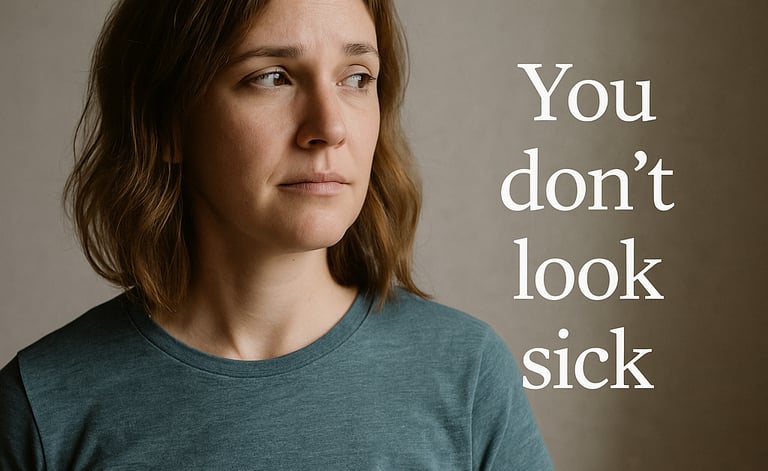THE LONG MIDDLE
NEW STORIES EVERY WEEK on substack
You Don't Look Sick
"You Don’t Look Sick" challenges the quiet assumptions people make about health. Through personal reflection on living with an invisible illness, it explores the gap between outward appearances and the daily realities of pain, fatigue, and endurance. A story about resilience, understanding, and the truth that you never really know what someone is carrying.
Mary Monoky
8/9/20252 min read


The most painful part wasn’t the eye rolls.
Or the note in the chart that said “anxious.”
It wasn’t even the disbelief in the doctor’s face
when I tried to explain what was happening inside me.
The most painful part was losing my faith.
Not in God.
In medicine.
I believed in the system.
I believed if you were honest, if you kept records,
if you showed up looking put together, they would help you.
That belief was the last thing to go.
And when it did—
I didn’t feel angry.
I felt alone.
Because once you lose that faith,
you start to float.
You become one of them.
The ones who talk too much in waiting rooms.
The ones who bring folders and say, “But I read online…”
The ones doctors don’t listen to.
And I hated that.
I hated becoming someone I used to pity.
But what no one tells you is: those people?
They didn’t start there.
They were made.
By dismissal.
By exhaustion.
By the slow undoing that happens
when you’re doubted again and again—
until your own story starts to sound suspicious
in your own ears.
You begin correcting yourself mid-sentence.
You apologize before every ask.
You laugh so the nurse doesn’t feel uncomfortable.
You hide the worst of it from your own family,
because even their silence feels like judgment.
And then one day,
you find yourself describing a symptom
in the same flat voice you use to order coffee.
No urgency. No heat.
Just... routine.
And they say, “Well, your labs look fine.”
And you nod.
And you go home.
And you lie on the bathroom floor
because it’s cool
and still
and no one expects you to explain.
They don’t see that part.
They don’t see the quiet collapse
after being dismissed again.
They don’t see the hours you spend
wondering if you imagined it—
if maybe this is just how aging feels,
or stress,
or grief,
or weakness.
That’s the damage.
Not the pain.
The part where you stop trusting your own perception.
It doesn’t take cruelty.
Just a long series of doubts
that make you forget
what you knew to be true.
But I’m not asking to be believed anymore.
I’m asking to be left whole.
You don’t have to fix me.
You don’t even have to understand me.
Just don’t erase me while I’m still here.
Don’t rewrite the truth I live in.
Because I do know this body.
I know when something’s wrong.
I know when it’s more than stress.
I know when I’m not okay.
And I’m done handing over that knowing
to people who look at me and say:
“But you don’t look sick.”
I do.
And that’s enough.
This story lives in Compass Point 1 — What Happened?
Photo by Andre Hunter on Unsplash...
© 2026. All rights reserved.
Stories of the long middle — finding meaning, endurance, and quiet beauty.